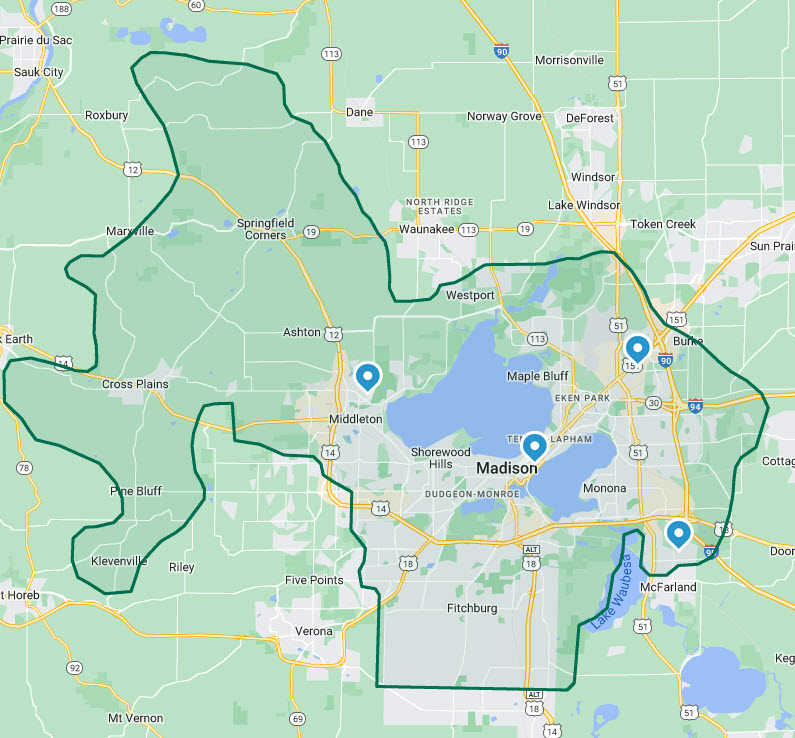When Power Goes Out
Español

MGE's outage map shows the separate situations where unexpected problems with equipment or power lines, or planned maintenance activities, are affecting customers in MGE's electric service area. We rely on our customers to notify us when an outage occurs.
Most power outages are caused by storms or accidents. Although these forces are beyond our control, we're ready to respond quickly and safely to restore your electricity as soon as possible.
When your power is out
- See if your neighbors' power is out. If it is not, check your fuses or circuit breakers. If it is, look out your windows for anything unusual like fallen wires or tree limbs on a line. Always stay away from any downed wires.
- Report your outage. MGE depends on customers calling us when their power goes out to help us most quickly identify and fix the cause. Please note: We can only restore electric service for MGE electric customers. If you receive electric service from a different provider, please contact them when your power goes out.
- Click the "Report Outage" button on our outage map page,
- Text "OUT" to 73904, OR
- Call MGE at (608) 252-7111 or 1-800-245-1123.
- Minimize potential for further impact. Unplug sensitive electronic equipment and turn off light switches to help prevent overloads when power is restored. Keep refrigerator and freezer doors closed.
- Use a battery-powered computer or radio for news updates.
- If your power remains out after your neighbor has lights, call MGE.
Hot-weather outages
A lengthy outage in the summer requires you to take extra precautions to cope with the heat. Hot weather can place a dangerous strain on your body, especially your heart. Prescription drugs for high blood pressure, nervousness, depression, poor circulation or insomnia may make you more vulnerable to the heat. Check with your doctor or pharmacist if you are taking medicine for any of these conditions.
Ice
Bags of ice or dry ice may be bought at grocery and convenience stores. Remember, dry ice must be handled very carefully:
- Wear gloves.
- Use in a well-ventilated area.
- Follow other safety tips provided by the seller.
Hyperthermia
As the temperature rises in your home, you may be at a higher risk for developing hyperthermia. This means that your body temperature has increased from being exposed to the heat. The best way to prevent hyperthermia is to stay cool.
- Spend as much time as you can in cool areas: a cool room in your home, the library or a shopping mall.
- Close drapes and shades during the hottest part of the day to block the sun’s rays.
- Wear loose-fitting, lightweight cotton or cotton-blend clothing.
- Drink plenty of nonalcoholic liquids.
- Take cool baths or showers or place wet towels on your body to cool it down. This provides more relief from the heat than cool air.
- Slow down. Physical activity produces body heat.
Food preservation
During a lengthy outage, you should take extra precautions to preserve food in your refrigerator and freezer. MGE is not responsible for any loss of food you might experience. Here are some basic tips for keeping food safe:
- Keep the refrigerator and freezer doors closed as much as possible to maintain the cold temperature.
- The refrigerator will keep food cold for about 4 hours if it is unopened.
- A full freezer will keep the temperature for approximately 48 hours (24 hours if it is half full) if the door remains closed.
- Buy dry or block ice to keep the refrigerator as cold as possible if the power is going to be out for a prolonged period of time. Fifty pounds of dry ice should hold an 18-cubic-foot fully stocked freezer cold for two days.
- If you plan to eat refrigerated or frozen meat, poultry, fish or eggs while it is still at safe temperatures, it's important that each item is thoroughly cooked to the proper temperature to assure that any foodborne bacteria that may be present is destroyed. However, if at any point the food was above 40°F for two hours or more—discard it.
Once power is restored
You'll need to determine the safety of your food. Here's how:
- If an appliance thermometer was kept in the freezer, check the temperature when the power comes back on. If the freezer thermometer reads 40°F or below, the food is safe and may be refrozen.
- If a thermometer has not been kept in the freezer, check each package of food to determine its safety. You can't rely on appearance or odor. If the food still contains ice crystals or is 40°F or below, it is safe to refreeze or cook.
- Refrigerated food should be safe as long as the power was out for no more than 4 hours and the refrigerator door was kept shut. Discard any perishable food (such as meat, poultry, fish, eggs or leftovers) that has been above 40°F for two hours or more.
Keep in mind that perishable food such as meat, poultry, seafood, milk and eggs that are not kept adequately refrigerated or frozen may cause illness if consumed, even when they are thoroughly cooked.
Source: U.S. Food and Drug Administration